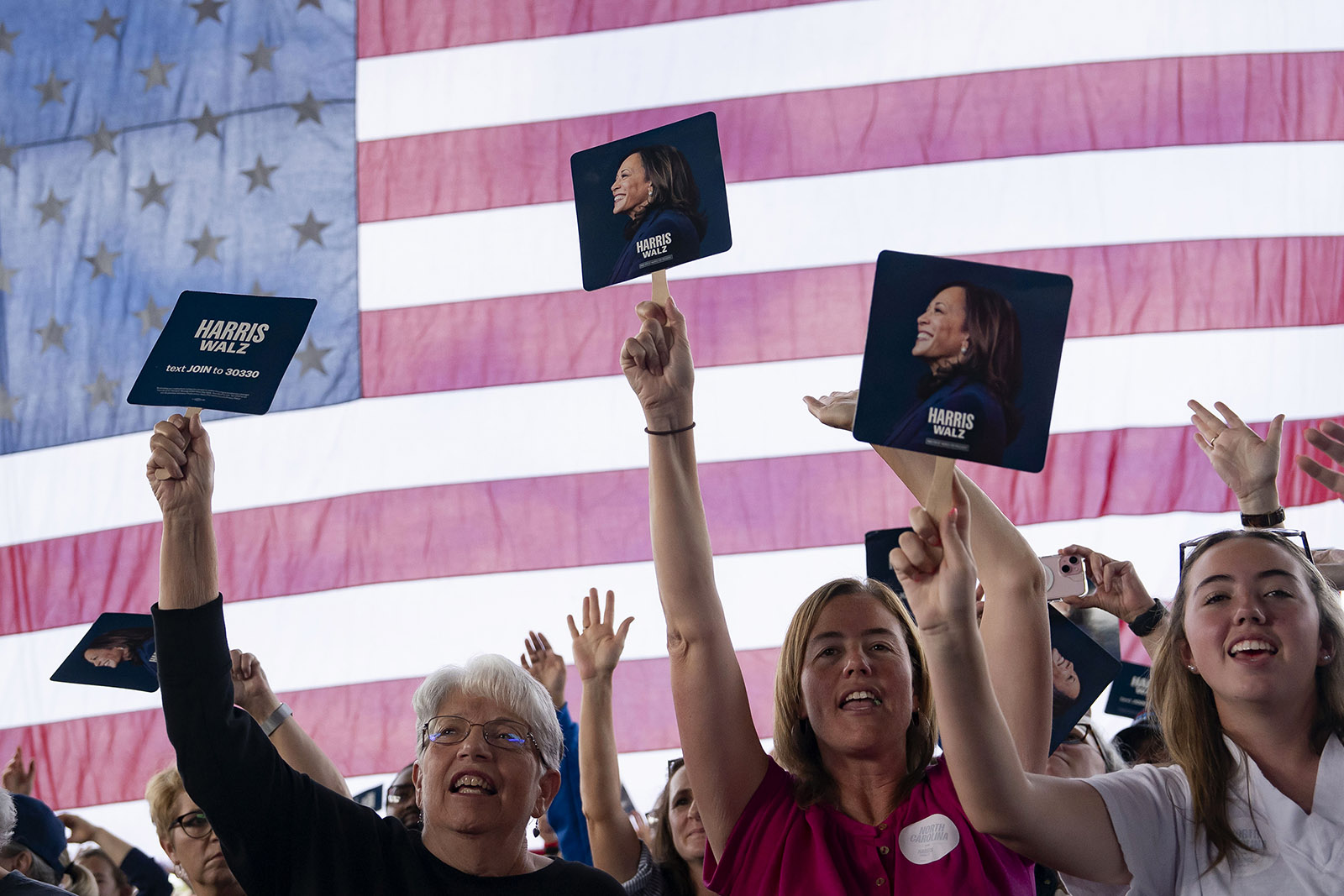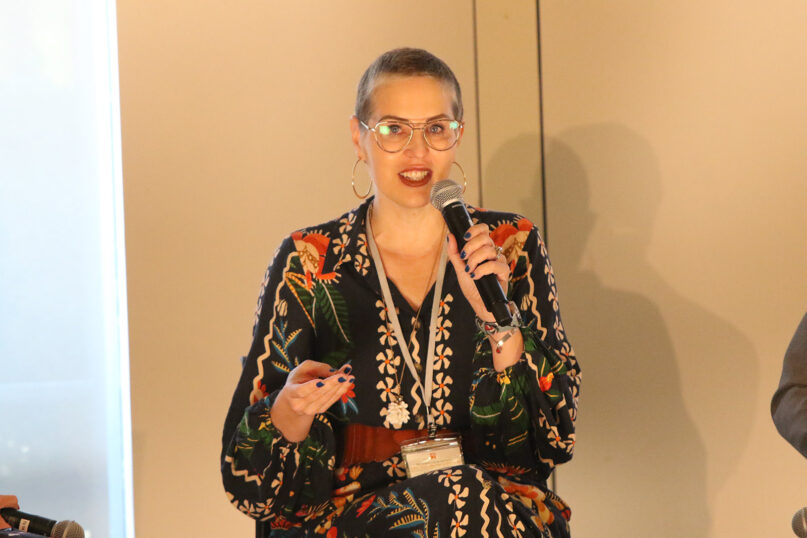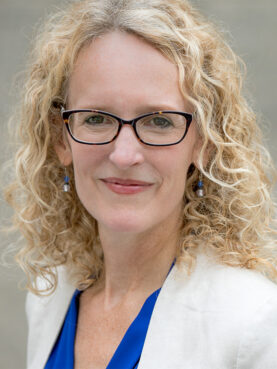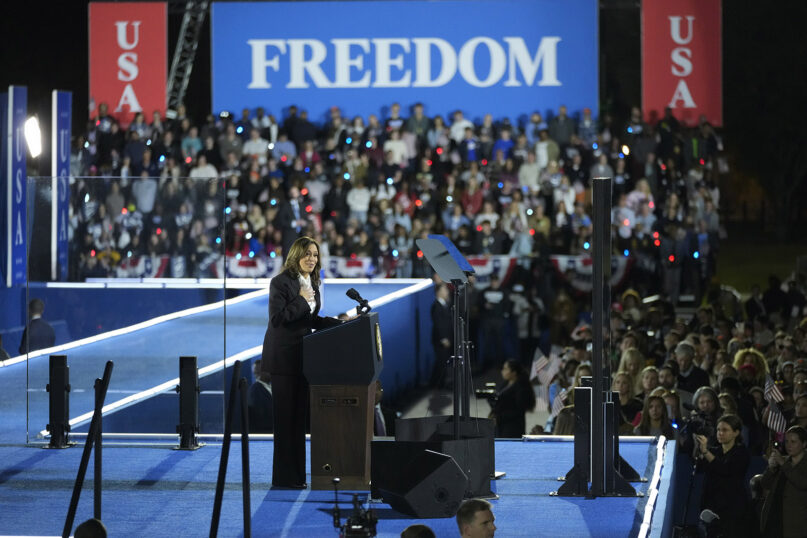
(RNS) — Kellianne Clarke doesn’t really have time for an interview.
An active member of her Church of Jesus Christ of Latter-day Saints congregation in Chester County, Pennsylvania, she spoke to RNS earlier this month while preparing a lesson she planned to lead for her church’s women’s group the following Sunday. A mother of four with a master’s in strategic communication who regularly serves on various nonprofit boards, Clarke also helps lead the local chapter of the Relief Society, the LDS church’s national women’s group. All that, along with her long history with the church, means she is in constant conversation with her fellow Mormons.
But there’s one thing she hasn’t really talked to her faith community about: her plans to vote for Democrat Kamala Harris.
“I generally don’t talk politics with the people of my local congregation, mostly because I believe I’m generally an outsider,” said Clarke, a graduate of Brigham Young University, the LDS church’s flagship university. She describes herself as a “liberal mom” — but only in the religious sense, compared with fellow Mormons.
“People tolerate that, but don’t really want to talk about it,” she said.
Talkative or not, the Harris campaign hopes women like Clarke will make their voices known at the ballot box on Tuesday (Nov. 5). In addition to outreach to Black Protestants, Hispanic Christians and many other groups, Democrats are betting big that a subset of conservative women — specifically white, suburban religious women who have traditionally voted for Republicans — will back Harris this year for a constellation of reasons, be it questions about former President Donald Trump’s character and dedication to democracy or concerns about winnowing women’s rights.
For Clarke, the choice was clear long ago. As a registered independent, she typically splits tickets when voting, dividing her support between Democrats and Republicans. But in the past few election cycles she has voted for Democratic presidential candidates, in no small part because of her ambivalence about Trump.
“My vote for Kamala is because I believe that she believes in common good, and I believe Donald Trump believes in himself, and is self-serving,” she said. Trump is “just about cronyism and lifting up only the people he believes are good enough to be up with him, rather than the commonality that binds us all together.”

Nancy French speaks on a panel during the RNS 90th Anniversary Symposium and Gala, Sept. 10, 2024, in New York City. (RNS photo/Kit Doyle)
Concerns about Trump’s character and conduct are also front of mind for prominent evangelical Christian author Nancy French, who announced on RNS’ “Saved by the City” podcast this month that she plans to back Harris.
In a separate interview with RNS, French, who said she didn’t vote for either major party candidate in 2016, cited Trump’s role in the Jan. 6, 2021, attack on the U.S. Capitol as one of several reasons to oppose him.
“Jan. 6 changed the political dynamic for me,” she said, adding that she long ago decided to never vote for an “election-denier.”
“The presidency qualifies as an important office that needs to be filled with someone who appreciates the value of democracy and actually preserving it. That’s why I’m voting for Harris,” said French, author of this year’s “Ghosted: An American Story.”
Being public about her vote, French said, is an intimidating prospect. She recounted the fierce blowback she and her husband, New York Times columnist David French, have experienced because of their criticism of Trump. “If you could have lived my life and David’s life, you would not want to have anything to do with Trump,” she said.
Even friendly conversations can descend into political debates. French recalled how a pickleball opponent recently sent her a video from his pastor as a conversation starter about whether Democrats belong to a “satanic death cult.”
“It’s very difficult to say that out loud, because the Christian pressure in white evangelical churches to support Donald Trump is very, very strong,” she said, referring to her support for Harris. “A lot of people don’t want to deal with the hassle of being perceived as a liberal or a Democrat.”
These tensions make it difficult to track any shift toward Harris among white conservative women. There is evidence Harris has made gains among white women overall: A Reuters/Ipsos poll released on Wednesday showed Trump and Harris splitting the vote of white women 46% to 44%, a notable improvement over 2020, when they favored Trump over Joe Biden by 16 points. But there is suspicion that some white conservative women who historically vote Republican would not admit support for Harris to pollsters or campaign staffers.
That hasn’t stopped the Harris campaign from launching robust efforts to court the group, including a string of events featuring the vice president and former U.S. Rep. Liz Cheney, a cradle Republican and a United Methodist who as a congresswoman from Wyoming led a House inquiry into the Jan. 6 riot and has been staunchly critical of Trump.

The Rev. Jennifer Butler. (Photo by David F. Choy)
“I think we have an opportunity there to engage particularly evangelical women in this conversation,” said the Rev. Jennifer Butler, a Presbyterian minister, shortly after she became the faith outreach director for the Harris campaign in August.
“I’ve seen a lot of evangelical women coming our way who want us to join in common cause, to support women and families,” Butler continued. “I think they’re seeing the hypocrisy and the Republican approach … to put women and doctors in jail, to be very punitive. That kind of criminalizing of abortion actually does not create the conditions for strong family life (or) for protection of women and strong families.”
The Harris campaign unveiled a new effort in early October to court members of The Church of Jesus Christ of Latter-day Saints in Arizona, and an initiative by the group Evangelicals for Harris, which operates separately from the campaign, has convened calls specifically for conservative Christian women.
Another group, Vote Common Good, led by progressive evangelical pastor Doug Pagitt, released two new digital ads this week with voice-overs by actors George Clooney and Julia Roberts. In the latter, women wearing patriotic clothing are shown casting ballots for Harris in voting booths in apparent defiance of a man in a bald eagle hat, who later asks if they “made the right choice.” The ad, which organizers say they are hoping to run on cable networks, ends with Roberts saying, “Remember: What happens in the booth, stays in the booth.”
The ad speaks to a dynamic Clarke said impacts many women navigating patriarchal pressures.
“I think a lot of it is fear-based,” she said. “They don’t speak out because they’re afraid of whatever the retribution is from a husband, from a boyfriend, from a neighbor, from a workplace.”
But while some may not be public about their politics, Clarke said conservative religious women sometimes reveal their support for Harris in private moments. Clarke has been surprised to hear from several religious women in her hotly contested county — Mormons and members of other religious traditions, such as Catholicism, she said — who told her they planned to back Harris as well.
“They told me it’s about character leadership and servant leadership, rather than sort of strictly party and religious responsibility,” Clarke said.

Democratic presidential nominee Vice President Kamala Harris speaks during a campaign rally in Washington, Tuesday, Oct. 29, 2024. (AP Photo/Ben Curtis)
In addition, Clarke noted some conservative women may be drawn to Harris for reasons not altogether different from more traditional liberal voters, such as their wish to take a stand in favor of abortion rights. Clarke grew emotional as she described how she “had to experience health care for an untenable pregnancy,” which had a profound impact on her.
“My view of, let’s even say, abortion, has grown more compassionate and empathetic and generous,” she said.
French said she would be “pleasantly surprised” if a cadre of conservative religious women break for Harris but that in Tennessee, where she lives, “almost every single person that I meet is supporting Trump.”
“I’m pretty despondent over the whole thing, honestly,” she said.
Clarke was more optimistic, saying she wouldn’t be surprised if “women come out in more numbers than expected for Kamala Harris,” noting that “women tend to rally around other women.”
“I think that there’s a great deal of fear of what Donald Trump could and would do in terms of women, women’s rights, women’s bodily autonomy, just what he would do for women in general,” she said.
Clarke, herself one of eight children, has two sisters who live in the swing states of Georgia and North Carolina. She said they, too, plan to vote for Harris, and like Clarke, they’re busy: They are currently working to convince their parents — who just moved to North Carolina — to join them in casting a ballot for the Democrat.
“We have been in a full court press,” she said. “We’re like, ‘Do not follow your tradition of voting for Republican candidates.’”
